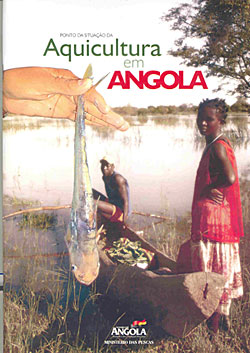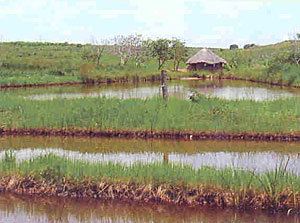|
Aquaculture Picking up in Angola |
 The pros and cons of aquaculture are often under debate, but the sector keeps growing in the region and Angola is no exception. Aquaculture in Angola is considered one of the priorities of the Angolan Government to promote sustainable economic development and contribute to poverty reduction. The country has high potential for aquaculture activities and the last years have seen renewed interest from the private sector and concerted efforts to put in place an adequate regulatory and policy framework. This article summarises some of the information presented in the Ministry of Fisheries publication entitled State of Aquaculture in Angola (2007), which has kindly been sent to DLIST by the Institute for Development of Artisanal Fisheries and Aquaculture (IPA). The pros and cons of aquaculture are often under debate, but the sector keeps growing in the region and Angola is no exception. Aquaculture in Angola is considered one of the priorities of the Angolan Government to promote sustainable economic development and contribute to poverty reduction. The country has high potential for aquaculture activities and the last years have seen renewed interest from the private sector and concerted efforts to put in place an adequate regulatory and policy framework. This article summarises some of the information presented in the Ministry of Fisheries publication entitled State of Aquaculture in Angola (2007), which has kindly been sent to DLIST by the Institute for Development of Artisanal Fisheries and Aquaculture (IPA).
Renewed interest in aquaculture
Angola is endowed with rich water resources and has excellent conditions for the development of aquaculture. In 2003 the Ministry of Fisheries launched a programme for the development of aquaculture. Aquaculture activities, especially inland aquaculture, are picking up, either through private sector initiative or through pilot projects implemented by the Ministry of Fisheries. In some provinces, communities of fishers have organised themselves into cooperatives and associations.
Inland aquaculture is the most lucrative and widely used practice. Fish farmers use artificial lagoons, cement tanks or earth ponds, and, in small scale, cages. There are currently aquaculture activities in the provinces of Cabinda, Luanda, Bengo and Moxico. In Cabinda province, for example, the growth of community fish farming has been motivated by both conflicts with the oil industry (restrictions on fishing areas, oil spills, etc) and influence from the Democratic Republic of Congo, where there is tradition of aquaculture.
Potential practices that have been identified for inland aquaculture in the country include hydro improvement systems that can be used to water farms and pastures, as a basis for livestock raising, as well as agro-aquaculture, which means aquaculture integrated with domestic animal raising.
While there is no reference to activities of marine fish aquaculture in the country, a number of prawn mariculture projects are planned in coastal provinces. The coastal prawn, lobster, and mussels are among the native species in Angola with potential for mariculture. Mussel farming has been tested in Angola with very promising results, though it has not been commercialised yet and its potential market is unknown. There are also species of fish, such as sole, that can be used.
 A growing legal and policy framework A growing legal and policy framework
While the Aquatic Biological Resources Law (Law N 6 A/04, 8 October 2004) sets out the general framework for both fisheries and aquaculture, a number of legal and policy documents have been enacted that specifically regulate aquaculture activities. Those documents include the National Aquaculture Policy (Ministry of Fisheries, 2004) and the Aquaculture Regulation (Decree N 39/05). The Progress and Sustainability Strategy for Fisheries and Aquaculture (Ministry of Fisheries, 2004) and the Land Use Plan for Fisheries and Aquaculture 2006-2010 (Resolution N 9/06) help set out strategic directions for these sectors.
Investing in training and research
The Institute for Development of Artisanal Fishing and Aquaculture (IPA) is planning the establishment of Aquaculture Research and Development Centres in 7 provinces of the country covering coastal and inland regions (Cabinda, Bengo, Benguela, Namibe, Malange, Moxico and Lunda Norte). These centres will be key to providing support to research and extension activities for aquaculture.
The Basic Fish Aquaculture Training programme, also an initiative of IPA, targets small fish farmers, household farmers and rural extension staff. The first course of the programme was held in 2006 in the province of Luanda (municipality of Cacuaco). The future Fishing Academy in Namibe, where there are plans for aquaculture as well as fishing training, will be an important centre to make the aquaculture sector in Angola more professional.
For more information please visit the website of the Ministry of Fisheries or contact the Institute for Development of Artisanal Fisheries and Aquaculture (IPA). More about aquaculture in Angola and in the BCLME region can be found on a dedicated Burning Issue on DLIST’s Info Hub.
|